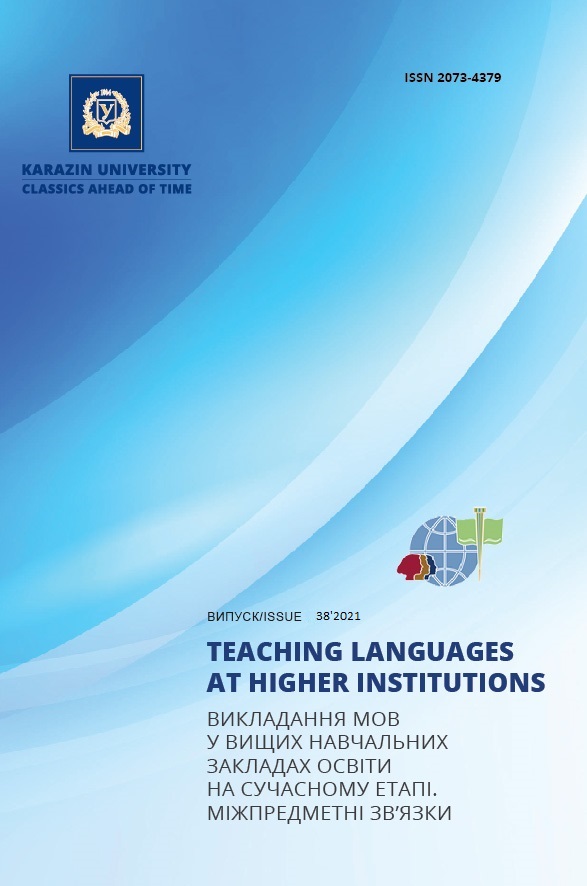Virtual tours as a way to enhance the cognitive activity of educational migrants
Abstract
The article studies the possibilities and features of the application of innovative methods of boosting the cognitive activity of foreign applicants for higher education in teaching. As a basic form, it is proposed to use a virtual tour as a way of learning Ukrainian as a foreign language.
The introduction of information technologies in the educational process has changed educational goals. In the future, we can expect a transition from online learning to a blended model. There is a reorientation to a person-centered approach. The main task of training is not only a transfer of knowledge but a formation of skills of obtaining and processing information, the formation of high-level thinking skills: analysis, synthesis, evaluation.
The use of multimedia capabilities of the computer has qualitatively changed the perception of information by foreign graduates. Today, the computer at the classes of Ukrainian as a foreign language is a visual aid, a means to increase emotionality, an encyclopedia, an electronic textbook, an accessible tool for knowledge control, as well as a possibility to effectively present new material, show a prepared presentation and more.
The aim of the article is to study the activation and effectiveness of cognitive activity of educational migrants and consider the basic principles and stages of preparation and conduct of educational tours using innovative technologies within the formation of linguistic and cultural competence of foreign students to make them master Ukrainian as a foreign language better.
The most effective means of competence development is the use of project methods in the educational process.
The virtual tour implements the principles of modern pedagogical activity: the principle of competence approach – obtaining a high result through the activities of higher education, the principle of cognitive activity – through independent, creative activity to obtain new knowledge.
Downloads
References
Andreeva, G.M. (2014). Sotsialnaya psihologiya [Social psychology]. Moskow: Aspekt Press [in Russian].
Alexandrova, E.V. (2010). Virtualnaya ekskursiya kak odna iz effektivnyikh form organizatsii uchebnogo protsessa na uroke literatury [Virtual excursion as one of the effective forms of organizing the educational process at a literature lesson]. Literatura v shkole [Literature at school], 10, pp. 22–24 [in Russian].
Belikova, O.V., Bessonova, N.M, Greul, O.O, Dityuk, S.O. and Tesalovskaya, O.B. (2018). Zmist profesiinoi kompetentsii vykladacha movnoi pidhotovky inozemnykh hromadian [The content of professional competence of a teacher of language training of foreign citizens]. Vykladannia mov u vyshchykh navchalnykh zakladakh osvity na suchasnomu etapi. Mizhpredmetni zviazky [Teaching Languages at Higher Institutions]. Kharkiv: V.N. Karazin Kharkiv National University, 28, pp. 7–16. Available at: http://nbuv.gov.ua/UJRN/vmvn_2018_32_3 [in Ukrainian]. DOI: https://doi.org/10.26565/2073-4379-2018-32-01.
Catalog of museums – Museums of the world. Available at: http://www.globmuseum.info/category/katalog-muzeev [Accessed 20 March 2021] [in English].
GoogleArts & Culture. Available at: https://www.google.com/ culturalinstitute/beta [Accessed 20 March 2021] [in English].
Gorina, S.G. and Sorochkina, E.M. (2018). Virtualnaya ekskursiya kak sovremennoe napravlenie primeneniya informatsionnyih i kommunikatsionnyih tehnologiy v obrazovatelnom protsesse [Virtual excursion as a modern trend of application of information and communication technologies in the educational process]. Nauka i perspektivy [Science and perspectives], 1, pp. 53–57. Available at: https://cyberleninka.ru/article/n/virtualnaya-ekskursiya-kak-sovremennoe-napravlenie-primeneniya-informatsionnyh-i-kommunikatsionnyh-tehnologiy- v-obrazovatelnom/viewer [Accessed 20 March 2021] [in Russian].
Mysheva, T.P. and Shalova S.Yu. (2013). Sozdanie virtualnogo muzeya kak effektivnaya mediaobrazovatelnaya tehnologiya pri izuchenii istorii pedagogiki [Creation of a virtual museum as an effective media education technology in the study of history]. Ros. zhurn. istorii, teorii i praktiki mediapedagogiki [Russian Journal of History, Theory and Practice of Media Pedagogy], 4, pp. 117–124. Available at: https://cyberleninka.ru/article/n/sozdanie-virtualnogo-muzeya-kak-effektivnaya-mediaobrazovatelnaya-tehnologiya-pri-izuchenii-istorii-pedagogiki/viewer [Accessed 20 March 2021] [in Russian].
Panina, E.A., Stash, S.M. (2015). Ispolzovanie interaktivnyih sredstv obucheniya v obrazovatelnom protsesse [The use of interactive learning tools in the educational process]. Nauchnyj almanach [Scientific Almanac], 1 (3), pp. 228–231. Available at: https://doi.org/10.17117/na.2015.01.228 [Accessed 20 March. 2021] [in Russian].
Platunova, E.V. (2017). Virtualnyie ekskursii kak sredstvo formirovaniya poznavatelnyih universalnyih uchebnyih deystviy obuchayuschihsya [Virtual excursions as a means of forming cognitive universal educational actions for students]. Molodoy uchenyiy [Young scientist], 14, pp. 645–647 [in Russian].
Slastenin, V.A., Isayev I.F. and Shiyanov Ye.N. (2015). Pedagogika [Pedagogy]. Slastenin, V.A. (ed.). Moskow: Shkola-Press [in Russian].
Selivanov, V. V. and Selivanova, L. N. (2014). Virtualnaya realnost kak metod i sredstvo obucheniya [Virtual reality as a method and means of learning]. Obrazovatelnyie tehnologii i obschestvo [Educational technologies and society], 17 (3), pp. 378–391. Available at: https://readera.org/virtualnaja-realnost-kak-metod-i-sredstvo-obuchenija-14062791 [Accessed 20 March 2021] [in Russian].
Sukhorukova, E. V. (2018). Virtualnyie ekskursii kak sredstvo patrioticheskogo vospitaniya [Virtual excursions as a means of patriotic education]. Aktualnyie problemyi modernizatsii matematicheskogo i estestvenno-nauchnogo obrazovaniya: materialyi. Vseros. nauch.-metod. konf. s mezhdunar. uchastiem [Actual problems of modernization of mathematical and natural science education. Collection of scientific papers based on the materials of the All-Russian Scientific and Methodological Conference]. Lyashko, M.A. (Ed.). Saratov, pp. 79–82 [in Russian].
Ustyuzhanina, N.V. (2017). Virtualnaya ekskursiya kak innovatsionnaya forma obucheniya [Virtual excursion as an innovative form of training]. Nauka i perspektivyi [Science and perspectives], 2, pp. 70–74. Available at: https://cyberleninka.ru/article/n/virtualnaya-ekskursiya-kak-innovatsionnaya- forma-obucheniya/viewer [in Russian].
Yulenkov, S.E., Kotelnikova S.V. and Kasatkina, A.S. (2016). Sovremennyie virtualnyie ekskursii i sredstva razrabotki virtualnyih ekskursiy v muzeynoy deyatelnosti [Modern virtual tours and development tools of virtual tours in museum activities]. Reshetnikovskie chteniya [Reshetnikovsky reading], 2, pp. 239–240 [in Russian].

